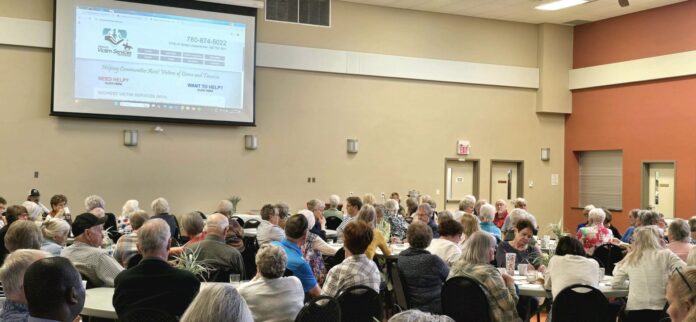A family safe word is one of the takeaways as Lloydminster residents got a full day of learning on Fraud Prevention.
A packed Grace United Hall heard presentations from RCMP, Victims Services, Servus Credit Union and Julie Matthews, fraud prevention educator.
“With grandparent scams being so prevalent, people will call you pretending to be a family member in trouble. With the Artificial Intelligence (AI) technology advancing so rapidly where someone can call us and pretend to be a family member – and actually sound like that family member. Having a family safe word or password so that we can use that when someone calls pretending to be a family member – I think it’s such an easy and quick solution.”
Matthews knows of three Alberta families that have been saved from the grandparent scam because they had a safe word.
Turning to romance scams where people face loneliness and vulnerability, Matthews says the scammers are online predators.
“They know exactly what to say and exactly what to do. And they are in it for the long game. So, they will talk to someone for months or even years to get all of that money that they can.”
Participants learned a few things about doing research like reverse image search, looking closely at email addresses, and look for the red flags.
“If someone is contacting you out of the blue, you need to click on their profile, if its on social media or on the dating site, and check them out. Are they new to Facebook – that’s a red flag. If there is an out of country connection, where they are outside of Canada, working or visiting family, that’s another red flag. And you shouldn’t send money to someone that you do not know.”
But the pull on the heartstrings over time is very strong.
“Even if you think you are in love with them. You know them. You can talk to anyone from your bank, to fraud prevention experts and police, and they will all tell you the same thing. You know, you can talk to someone all you want, but please don’t send money or give personal information,” says Matthews as she acknowledges that romance scam are absolutely devastating.
“They target you emotionally and financially. And it is the one scam that I think is the worst for people not telling friends or family. Or coming forward to police.”
The embarrassment factor holds people back and gives the scammers the upper hand.
“Women are more likely to come forward than men. I know just as many male victims that fall for it, as women. They desperately want to believe that this person is real.”
When the topic came up, there may have been some snickers in the audience, but when Matthews had dug deeper into romance scams, it struck a nerve with participants.
“I’m on a personal crusade to keep anyone from ever calling a scam victim stupid. I have met so many scam victims and they are not stupid. They are heartfelt. They are vulnerable, and they just made a bad choice.”
Matthews says her mission is to help people to understand romance scams better so that we do not shame the victims.
“We don’t want the scammers to win. We want those people to tell their family members that they are in trouble. Tell the police. So many people stay quiet and they have lost so much money. Hundreds of thousands of dollars are gone.”
Matthews notes there are scams that target everyone and she wants to reach the young working group between 19-49 years.
“They are busy. They probably think they are invincible. They think they know what they probably need to know about scams, but they are really being targeted.”
Data from the Canadian Anti-fraud Centre indicates that most fraud victims are between the ages 20-49.
More resources:



